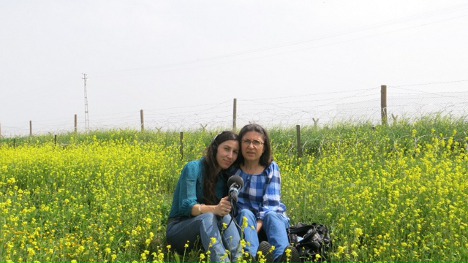It's the dead of night on the Syrian-Turkish border.
The human traffickers tell Diljen she must be quiet. They tell the parents "If your child wanders off, we keep going". Her mother thinks to herself: "Will we be alive in a few hours?" They start walking. After barbed wire has snagged their clothing over and over again, they reach the mine fields. The smugglers tell them to walk in single file line between them, which they do.
Then a child starts crying. The border guards can hear them but not see them. It doesn't stop them from shooting.
"The bullets fall like rain over us," Diljen's mother recalls in a documentary broadcast recently on Sveriges Radio (SR) P1. Miraculously, no one dies.
More than thirty years later, Diljen goes back with her own daughters in tow. Her mother comes too. They disagree about what to tell four-year-old Jinda.
"Why must her little brain cope with all that?" her mother asks.
Jinda spots a huge Turkish flag and asks her mummy and grandmother why there's a Turkish flag in Kurdistan. The explanation is hesitant, but Diljen tells her a bit. The grandmother does not approve.
"Mum still feels a lot of guilt for bringing my little brother and me almost to the edge of death," Diljen tells The Local. "She told me she would never have done it if she'd known what it would be like."
But Diljen and her mother agree 100 percent on one thing: Jinda does not need to know about the violence.
"She can learn more about the violence later, because I want to pass on our past to her, I don't want the buck to stop with me," she says.
Left behind in Turkey was Diljen's father. He stayed despite torture, 45 days in prison, a second arrest warrant, and his wife and two children having to go underground for an entire summer. Diljen's parents' crime? Speaking up for their Kurdish identity. He would later join his family in Sweden.
On the eve of their escape, however, it was Diljen's mother packing the clothes for her children. Apart from the trousers, socks and shirts, she made sure to bring two things with her: a long gold chain and her university diploma. A former maths and natural science teacher, she now teaches newly arrived immigrant children in Sweden.
"I am so happy they get a teacher like her, she can really relate to their stories," Diljen says.
The radio documentary was also part of Sveriges Radio's drive to reach out to its listeners and make them co-producers in content. Listeners were invited to email a special address or tweet using the hashtag #minflykt ('my escape') and tell them their stories. These stories have been picked up by local radio stations across the country.
The buzz has made many children of migrants realize they are missing details about their parents' flight to Sweden.
"It's also important for those of us who had to escape that we are now sharing our stories with each other. We have a reason to talk about it," Diljen says, although some remain mum because the memories are too raw. "You have to respect that, because it's related to so much pain."
She also hopes that everyone in Sweden will learn the perils that migrants put themselves through to reach a safe haven.
"These stories show the people behind the statistics in migration politics," she says. "We so often talk in numbers, 'this many refugees died' etc., but they don't have faces and they don't have names in the reporting."
She said the response in the days following the documentary broadcast was so overwhelming that she walked the halls of the Broadcasting House with tears in her eyes.
"How can we understand if we don't hear the stories?" she says.
One email from a listener was succinct:
"Now, I know."
Editor's Note: The Local's Swede of the Week is someone in the news who – for good or ill – has revealed something interesting about the country. Being selected as Swede of the Week is not necessarily an endorsement.


 Please whitelist us to continue reading.
Please whitelist us to continue reading.
Member comments